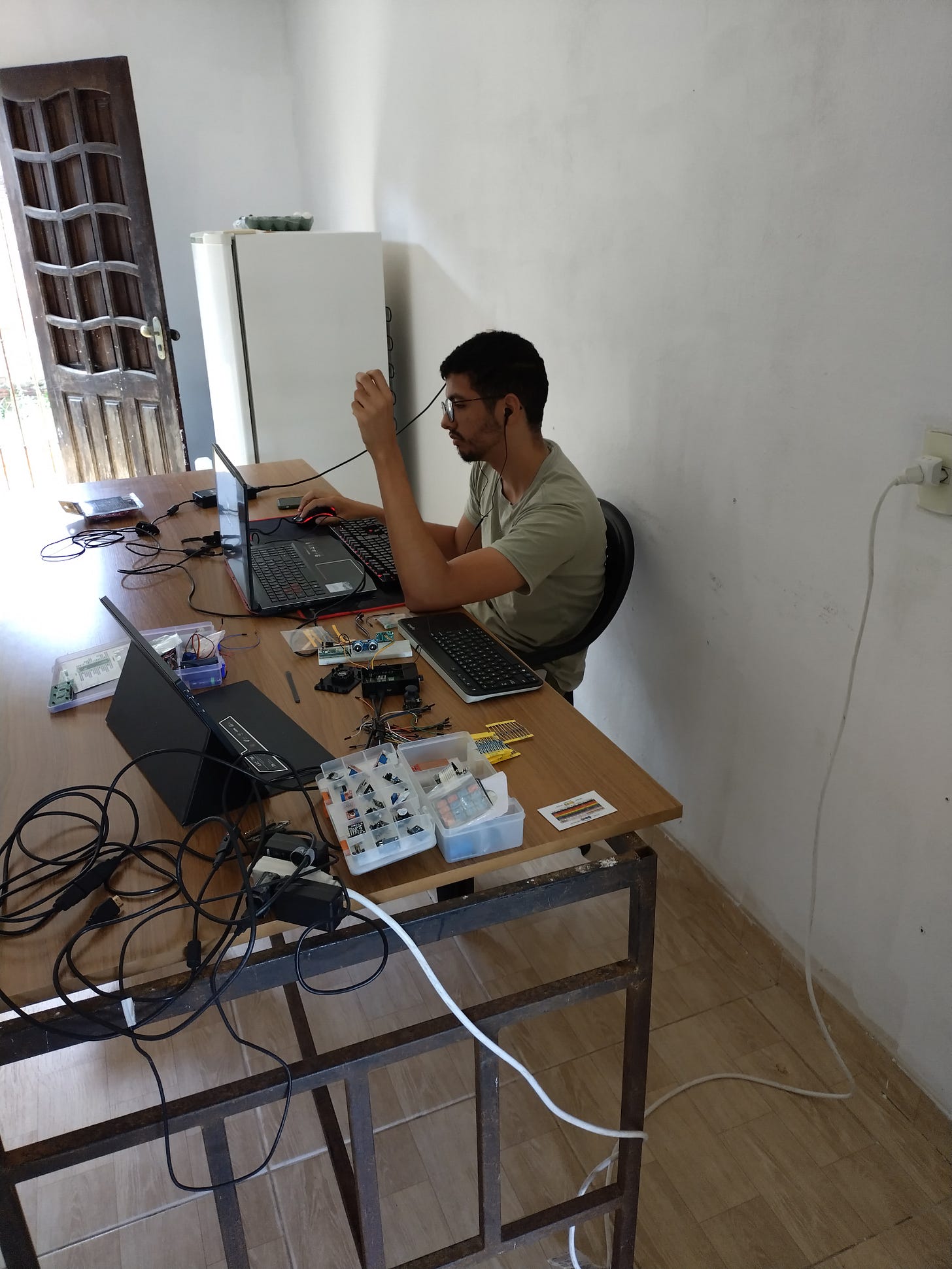Monthly Update: Building Bridges from Goiana's Foundations
Leveraging the practical challenges and daily innovations of establishing our maker space
Dear Friends and Supporters,
We've been hard at work here in Goiana, Pernambuco, leveraging the practical challenges and daily innovations of establishing our maker and co-working space to lay the groundwork for rural resiliency. To help others through this journey, I am writing some educational guides based on my experience here and along the Amazon.
Here is an excerpt from the introduction:
It’s no secret that the world of work is changing faster than ever before. New technologies are arriving every day, shifting the landscape of jobs and careers. While this can feel uncertain, it’s actually the beginning of a new season of opportunity, especially for communities like ours. These changes are creating new and exciting ways for rural communities to become more resilient, connected, and prosperous.
At the heart of this shift is an idea called the "knowledge economy." Think of it this way: for generations, our economy was based on what we could grow or make with our hands. In the knowledge economy, our ideas, our skills, and our unique local wisdom are the most valuable things we have. It’s a world that values not just what we can produce, but what we know and what we can create with our minds.
The advent of global satellite internet will indeed "thrust into the information age" billions of people in communities currently untouched by technology, bringing a rapid and profound transformation. These shifts will trigger a wide array of interconnected issues and questions, ranging from fundamental digital literacy to complex ethical dilemmas, and will demand a nuanced approach to development and integration.
The goal is to help youth in rural communities develop skills based on a local knowledge. Starting from low-tech with local resources while developing the skills needed in the growing knowledge economy. Much of this information will be published to my newsletter and websites for free.
Maker Space Guide to Rural Futures
I am starting to take orders for the first of these guides. This guide based on jobs that will continue to be in demand in the future provides suggested maker space projects starting from local knowledge and resources.
Rural communities are uniquely positioned to embrace future job roles that blend traditional knowledge with emerging technologies, fostering local economic resilience and addressing pressing environmental concerns. The shift towards a knowledge economy emphasizes the application and contextualization of information to create value and solve problems. This transformation requires a focus on skills development, innovation, and integrating local wisdom with technological advancements. Based on my experience working with remote and rural communities throughout the world, I have compiled a list of five jobs that will be important for the future of rural communities. This guide also includes actionable items you or your students can use to begin exploring these opportunities.
Maker Spaces: Bridges For Rural Youth
One of the greatest challenges of our time is bridging the global "digital divide." This isn't just about providing internet access; it's about moving communities from being passive consumers in an information society to becoming active creators in a true knowledge economy. The last several years of my journey has been an exploration of how advanced technical expertise can be adapted to empower communities that lack modern infrastructure.
In Goiana, I have been working with Renato and Ricardo to develop a data analysis team around the electronic nose system. Last year, I started a project with a client interested in developing a device to detect certain household issues based on smell. The device uses AI to train the detection algorithm. The technology can be used in a wide range of applications. We are developing a system that enables remote collaboration during the data collection and development process. We are also developing specific knowledge to support other clients in implementing this specialized tool.
That project for that client continues to be on hold, but the client reached out to me a few weeks ago. He is at a point where he can start testing. We were able to deliver an electronic nose trained on his initial data. We now have a verified process in place so we can start looking for another client for our electronic nose system.
This is one example of how a maker space can provide opportunities to develop specific skills locally which can open doors to remote opportunities.
Ricardo's Progress: Hands-On Learning and Theoretical Foundations
Our team member, Ricardo, is making excellent strides in familiarizing himself with the equipment, demonstrating the practical application of our training approach. He is currently preparing to build a Raspberry Pi kiosk, a project that involves hands-on learning in electronics and embedded systems. This includes learning how to connect various sensors to the Raspberry Pi, a crucial skill for understanding and developing smart systems like our e-nose and other IoT projects. This kiosk will be used as the basis of an electronic nose demonstration kit that will be used by our local sales team.
Concurrently, Ricardo is expanding his theoretical understanding by taking a class in systems analysis, which will provide him with a deeper framework for understanding complex technological architectures and problem-solving, perfectly complementing his practical work. This combination of practical application and theoretical study is central to developing the highly skilled workforce emphasized by the knowledge economy.
Thank you for your continued prayers and support as we "build bridges" of knowledge and opportunity, both here in Goiana and through the development of our upcoming training program.
In Christ,
Chet Bailey
You can also make a one-time gift to support my work.



